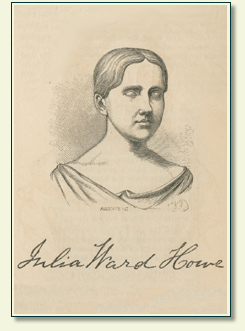
Evert A. and George L. Duyckinck, eds. Cyclopaedia of American Literature (1855), vol. 2, p. 681.
JULIA WARD HOWE (1819 – 1910)
As a child in New York City, Julia Ward Howe received upbringing and education in the homes of eccentric relatives after her mother died of tuberculosis. Going between the homes of her zealously Calivinist father and uncle and her social, literary aunt helped to instill in her a lifelong conflict between poetic "indulgence" and an abiding fear of frivolity. She married Samuel Gridley Howe, the director of the Perkins Institute for the Blind in Boston, and with him she had six children and, for many years, a miserable marriage.
In Boston, where she felt bored and ineffective as a homemaker and her husband adamantly opposed her participation in public life, she began to publish poems and plays anonymously, most of which critics panned as dark, melodramatic, or immoral. Despite his resistance to women's political involvement and his anger towards her unflattering descriptions of him in her writing, Samuel Howe nonetheless allowed his wife to assist him in editing his antislavery paper the Commonwealth and to become involved in the abolitionist cause. On an 1861 trip to visit the Union camps near Washington, she penned her famous "Battle-Hymn," publishing it the following year in the Atlantic Monthly. Set to the tune of the folk song "John Brown's Body," the "Battle-Hymn of the Republic" swept the North within a year, allegedly bringing tears to Lincoln's eyes and bestowing upon Julia Ward Howe unexpected celebrity.
After the war, she joined the women's suffrage movement in New England, where she took a leading role in many of the more powerful suffrage associations and found companionship among fellow suffragists. In 1870 she founded the weekly periodical Women's Journal, and she continued to write, edit, preach, and lecture well into old age. The "Dearest Old Lady in America," Julia Ward Howe became something of a press darling as she continued to appear, shrunken and bespectacled, behind podiums to advocate women's rights and warn against the immorality of modern times.

